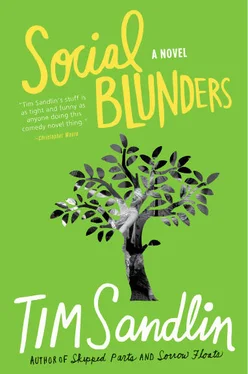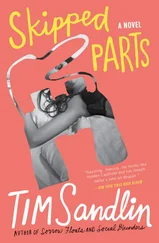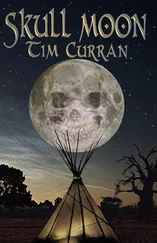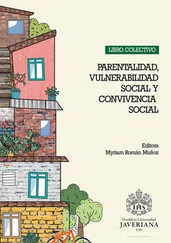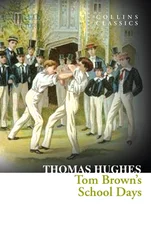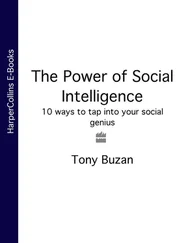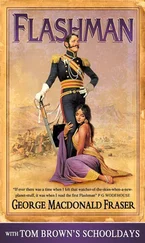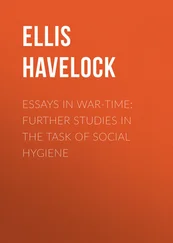“I guess so. Shouldn’t we break some glass or scream at each other first? That’s how I was brought up.”
Lydia carried her coffee dregs to the sink. “I’m tired of breaking glass. Cleaning up afterward is undignified.”
“Is this literal or metaphoric?”
Lydia looked at me a long time, then she sighed. “Sam, all your life I’ve never been able to decide if you walk around with your head in the clouds or up your ass.”
***
Hank balanced on the truck’s back bumper to strap a blue tarp over the amassed possessions. Even though Lydia’s saddle purse and bottle of water were already in place in the front seat, ready to take to the highway, this driving into the sunset thing still didn’t seem real to me, I guess because it’s hard to conceive of your mother as a fugitive from justice.
“Wait a day so you don’t miss Pete’s funeral,” I said.
Lydia had found a blue-and-yellow necktie left over from her Annie Hall phase. She held the folded tie up to my neck to check the color coordination between it and my skin. “I never was much for funerals,” she said. “Tell Maurey and Chet we’re sorry we couldn’t be there.”
I appealed to Hank. “What’s a day going to matter?”
Hank grunted from the strain of tightening the rope around the tarp.
Lydia said, “Women’s prisons are grossly underfunded. They must be avoided at all costs.” She stuffed the necktie into my coat pocket. “Have Maurey tie it, you’ll botch the job if you do it yourself.”
This was happening too fast. It seemed wrong to have finally made up with my mother, sort of, anyway, and fifteen minutes later lose her for God knows how long. We should be bonding or interfacing or whatever being nice is called these days.
She said, “Leaving you in charge of the house doesn’t mean some woman can waltz in here and change everything. I want the walls where I left them.”
“I’m done with women.”
“I’ll believe that when moose fly.”
Then Lydia did something completely uncharacteristic. She hugged me. I felt her head on my shoulder and her arms on my back. She was thinner than I’d imagined, and she smelled a bit like ink.
“Take care of yourself out there in the underground,” I said.
She leaned back with her hands on my elbows and looked into my face. “I’ll be fine. The government’s not big enough to touch women like me. You take care of my granddaughter.”
“I will.”
“Promise me you won’t raise her the way I raised you.”
“I wouldn’t dream of it.”
After Lydia got into the truck, Hank came around and hugged me too. It didn’t feel a bit weird.
“Feed the horses while I’m gone,” he said.
“Maurey’s not going to be happy,” I said.
“You’ll have to take my place.”
“Yeah, right.”
Hank grinned. “Nach-ki-tach-sa-po-auach-kach-pinna.”
“What’s that?”
“Blackfoot for ‘Keep your nose clean.’”
I stood in the snow, watching Hank’s truck slowly drive away. Just before he turned west onto the Yellowstone Highway, an arm came from the passenger’s window, fingers fluttered a good-bye wave, then they were gone.
Maurey was more than unhappy over Hank going underground with Lydia.
“We’re talking last straw,” she said.
I stood there, hands at my sides, wondering how I could save her. These crises are the times I’m supposed to take command.
Anger flashed in her eyes. “Who’s going to run the ranch?”
“It could be worse. I’ve lost my mother. Temporarily anyway.”
“I need Hank a lot more than you need a mother.”
That was true. At my age, a mother is more symbolic than nurturing, not that mine ever was nurturing. “I can help with the ranch.”
Maurey made a nasal sound indicating minor disgust. “Sam, this is a horse ranch; you’re afraid of horses.”
I hate it when people say that. “The ranch isn’t only a horse ranch. I can fix fence, and I’ve always wanted to learn irrigation. Moving water where it’s needed seems like a satisfying way to spend your time.”
Maurey sat in her stuffed rocking chair and stared at a spot in the air several feet in front of and slightly below her face. She said, “I have to call my sponsor.”
“Your sponsor?”
“Go find Pud. He needs your help in the hay shed.”
“Are you turning to God?” I asked.
“I’m turning to the telephone. You go help Pud and don’t come back for a couple of hours.”
Here’s my problem with Pud: Today, he seems nice enough and Maurey loves him and she’s past that stage women go through where they fall in love with creeps, so he must be okay, but way back when Pud was seven or eight his mother told him to drown a litter of kittens. As an alternative to drowning, Pud decided to let his God-ugly dog kill them. Maurey and I came upon the gory scene, there was a fight, the dog bit me, I bit the dog, and in the end we saved one kitten. That kitten was Alice, my closest pal for the next eighteen years.
Okay. Pud had excuses. He was only a child and his family was a bunch of ignorant yahoos, and back then everyone thought Pud was retarded so they treated him cruelly. I understand the excuses; but the fact is I can’t forget he once fed kittens to a dog. That was the same winter Lydia told me the rape story. People who can’t forget lead fetid lives.
I found Pud in the barn, grooming the stud.
“Molly’s in the hay,” Pud said. “We fed her three Marches ago when the snow was nose deep and the elk were starving, and now she thinks we owe her lunch all winter.”
“She’s a welfare chiseler elk,” I said.
“There’s a lesson to be learned, I guess.”
As Pud and I walked in silence up the sled track to the shed, it dawned on me for the hundredth time that I owed it to Maurey to be friends with him. Or, at least, friendly. They’d been together six years and Pud and I had yet to carry on a conversation between just the two of us.
I wasn’t certain where to begin. “Pud,” I said, “how’d you come to get into the satellite dish repair business?”
He was as surprised to hear me ask as I was to be asking. He kind of slid the corners of his eyes at me to see if I was putting him on. “Maurey and I were up the Ramshorn one July, delivering horses to the Bar Double R, and they had a dish. I didn’t even know what it was.”
“And that’s how you decided on a career?”
“I decided on a career when I saw eight full-grown cowboys hanging on every word of Jeopardy . Those old men had lived long, happy lives without TV, but three weeks after putting in the dish, they were junkies.”
“So, you look at your job as servicing junkies?”
“Heck, you should see the panic when a bandpass filter goes down. I charge seventy an hour, including travel time, which can be four or five hours back in the mountains.”
This was a bigger scam than golf carts.
“I could get two hundred if I wanted,” Pud said, “but that would be gouging.” He slid his eyes over at me again. “I’m no gouger.”
“I believe you.”
The hay shed wasn’t a shed in the North Carolina sense of the word. It was actually a large roof, larger than the roof on most houses, held up by telephone pole-looking logs about twenty feet high. The summer’s hay crop—or in drought years like this one, hay bought from Idaho farmers—was stacked in bales under the roof to keep dry, and a twelve-foot double-posted mesh fence surrounded the hay to keep out horses, porcupines, deer, moose, and elk, and anything else with a taste for grass.
The system worked fairly well except when someone forgot to close the gate properly, which is what happened the day Pete died. An elk—Molly—had gone through the fence and was eating her way around the stack, costing the ranch money it didn’t have to spare.
Читать дальше
